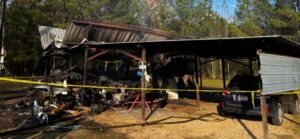Under the cover of night, Chickasaw warriors gather outside of Hernando de Soto’s camp, preparing to attack the Spanish conquistador’s army. But a short time after the attack begins, the indigenous fighters retreat suddenly.
While Rufus Ward, local historian, often tells stories like this through columns in The Dispatch, he told the story of this 1541 battle at the Columbus Exchange Club on Thursday afternoon from two perspectives: history books and Chickasaw tradition.
“They’re the only Indian nation that not only defeated a European army, but drove that army out of their country,” Ward said during the meeting at Lion Hills Center. “… They still have some oral traditions surviving that’s a little bit different than what the history books say.”
According to history books, Ward said, a fire that was lit during the attack reached de Soto’s stables. When the horses charged out of the stables, the Chickasaw warriors retreated from fear of a trap, thinking the horses were attacking them.
But according to Chickasaw tradition, Ward said, a swift attack followed by a rapid retreat was common practice to allow intruders to their land to leave without destroying the entire group.
“They said that’s what they did to de Soto,” Ward said. “They hit him quick. Only one Indian was killed while a number of the Spanish were. And then they backed off and sent the message. ‘We let you live, but we won’t next time.’ And de Soto left.”
Ward shared several other oral traditions and legends of the Choctaw and Chickasaw nations, highlighting how different versions of history often collide, and how modern perceptions of Indigenous lives are often inaccurate.
“I have found broken pottery, and it shows what kinds of plates the Indians were eating off of,” Ward said. “… This was one of their favorite English china patterns. You can tell the difference in a lot of the Indian sites from the early Anglo settler sites because the Choctaws had the fine china. It’s a different view of things.”
Ward also shared that more historical artifacts and information are still being discovered in the Golden Triangle.
Ward said he has recently been conducting research with the Chickasaw Indian Nation out of Oklahoma to discover the location of Hernando de Soto’s campsite from Dec. 1540 through March 1541, which was the site the Chickasaw warriors attacked. He believes the location could be within 10 miles of Starkville.
“Artifacts are being found that would go back to the de Soto period,” Ward said.
Ward said the evidence includes the diaries of men under de Soto’s command, along with physical pieces of evidence that have been found near Starkville, including a medallion meant to be worn around the neck of a horse.
Ward also displayed historical artifacts from throughout the history of Mississippi and Lowndes County to the club, including newspaper clippings, pottery and ceramics, currency and more, all of which painted a picture of information that cannot be learned through history books alone.
“People tend to write the history that they want people to remember,” Ward told The Dispatch following his talk. “And it’s not always correct, and it’s very interesting and insightful to go back. And one of the good things now is the Library of Congress has digitized millions of older newspapers. And rather than depending on what people say now, you can go back into that time period and look and see what people really said.”
You can help your community
Quality, in-depth journalism is essential to a healthy community. The Dispatch brings you the most complete reporting and insightful commentary in the Golden Triangle, but we need your help to continue our efforts. In the past week, our reporters have posted 46 articles to cdispatch.com. Please consider subscribing to our website for only $2.30 per week to help support local journalism and our community.




